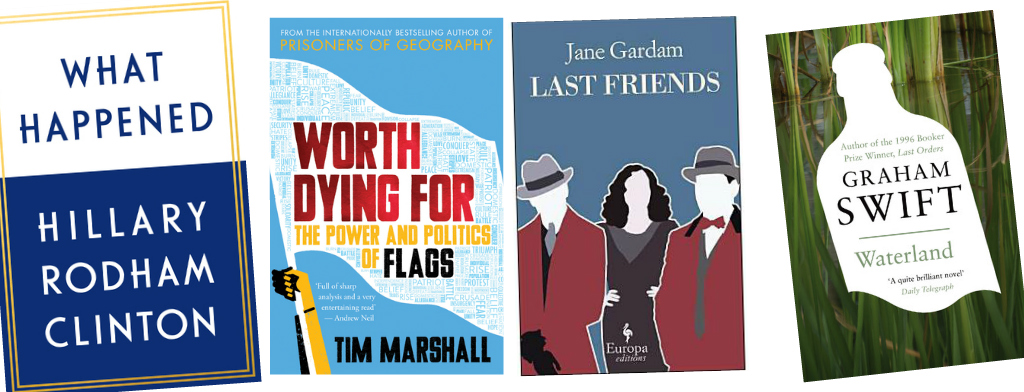
Selfie by Will Storr turned out to be my favourite non-fiction book of 2017 to date. I always love Storr’s writing: he’s remarkably talented and woefully underappreciated for his ability to bring clarity to complex socio-scientific fields. I go out of my way to read his journalism because, whatever the topic, his byline guarantees new insights and connections. This book was no exception. Storr wove autobiography, anthropology, history, religion, sociology, psychology, psychiatry and public health into a compelling narrative of humanity’s increasing focus on the self. And he did it with a good dose of dry wit that brought the whole thing alive. The ground covered has big overlaps with Yuval Noah Harari’s Homo Deus, but the execution was far better.
Buy on Amazon | View on Goodreads
Post Truth by Evan Davis never quite lived up to the promise of its subtitle. I was attracted by the idea that this book might have, as the subtitle suggested, made an argument that the world has reached ‘peak bullshit’ (and hence predicted a decline). That would have been a bold prognostication in the current political climate, but it was one that Davis didn’t really attempt to make. The book was a lot more pedestrian for that. It merely gave an overview of some of the things that drive people to lie, and expressed frustration at those who lie unnecessarily. It was concise and illustrated with interesting examples, but didn’t really say very much that was new, and came across as a bit patronising in parts.
Buy on Amazon | View on Goodreads
Luke Kennard’s novel The Transition was set in the near future, and followed a couple in a sort of life-education programme called “The Transition”. The idea of the programme was that members of an older generation take in a couple from a younger generation and teach them how to live in the modern world… though, of course, this being a dystopian novel, it wasn’t quite so straightforward. Kennard’s writing was pretty solid, and the plot moved forward well through the first two-thirds of the book. The ending, though, was strange. The whole book built to a confrontation that just fizzled away. Perhaps that’s a metaphor for something, but it’s also deeply unsatisfying.
Buy on Amazon | View on Goodreads
Going Nowhere, by The Spectator‘s Sam Leith, was a very short autobiography structured around six video games he’s been obsessed with at various points in his life. It was far better than than the premise promised. I’ve never played any of the games, and have only vaguely heard of a couple, but that didn’t matter. Leith deftly combined descriptions of gameplay with personal reflection on life’s choices and challenges, the move from relatively “normal” beginnings to the “elite” via an all-paid Eton scholarship, and the philosophical insights of great poets. There was a great deal more Latin than you’d expect in thirty-odd pages on video games, yet it skillfully avoided pretension. I really enjoyed this short book.
Buy on Amazon | View on Goodreads
Mark Earnest Pothier’s The First Light of Evening was a sixteen page tale in which a retired divorcee went on his first date after his wife left him. This short story has won awards and much critical acclaim, so the fact that I found it a bit “meh” may say more about me than the book. I found it a reasonably pleasant read, but neither particularly insightful nor particularly absorbing, and full of grammatical errors (or maybe ‘artistic grammatical choices’, who knows?) which distracted from the meaning of the text.
Buy on Amazon | View on Goodreads
Guns was Stephen King’s short essay on US gun violence. I found it difficult to wrap my mind around the logic of King’s position—which I’d inadequately summarise as ‘ban the worst guns, protect everyone’s right to have less-bad guns’. The essay was strong on the former, but weak on explaining the rationale for the latter (beyond pragmatism). King hung his position on autobiography, describing his response to a shooter who cited one of King’s fictional works as part motivation, part inspiration for his crime. This was interesting enough, but I think would have benefited from a bit more reflection on how his ability to act was influenced by his uniquely powerful position in publishing.
Buy on Amazon | View on Goodreads
The Kids Don’t Stand a Chance was a short autobiographical essay by Harris Sockel about teaching in the “Teach for America” programme. This scheme, much copied around the world, entices young graduates to teach in schools for a couple of years after graduation. Sockel attempted to illustrate the programme’s flaws from the points of view of the teachers, the pupils and the schools, with some success. He also attempted to provide some insight into US public schools more broadly. I was left wondering a little bit about how generalisable Sockel’s experiences were, particularly given his wealthy background which was frequently contrasted with that of the ‘regular’ teachers and his pupils, and—possibly more because of the format than the author—felt that this book left me with more questions than answers.
Buy on Amazon | View on Goodreads









